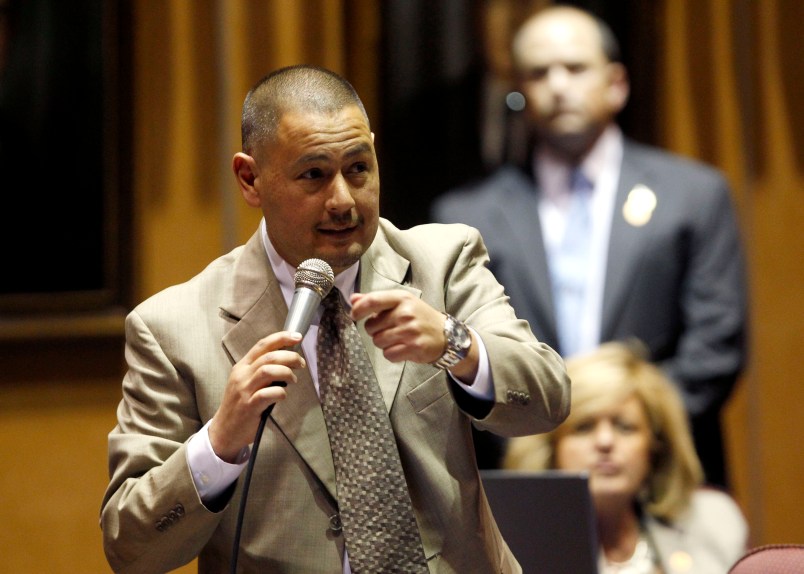Arizona state Sen. Steve Gallardo (D) came out as gay Wednesday, a week after Republican Gov. Jan Brewer vetoed legislation that would have allowed discrimination against LGBT residents.
The tone of that debate and the national firestorm that descended on Arizona while the bill sat on Brewer’s desk motivated Gallardo to come out publicly, he told TPM in an interview. He had come out to his friends and family years ago, he said, but the anti-gay legislation that he voted against and Brewer eventually rejected convinced him that he needed to “take a stand.”
Gallardo, who is now running to replace retiring U.S. Rep. Ed Pastor (D), discussed his decision with TPM and what it was like to be a gay lawmaker in a conservative state, where, he said, his legislative colleagues would make derogatory remarks in the state capitol’s elevators and his parents were uneasy when he said he intended to tell the public that he was gay.
The following transcript has been edited for clarity and length.
TPM: For starters, why did you feel it was important to make this announcement now?
Arizona Sen. Steve Gallardo: This is something I’ve been thinking about for the last couple of weeks. I have served here for the last 12 years. I’ve taken on some of the most high-profile issues here, and (the anti-gay bill) is no different. I went to the floor to argue against this bill, as I have argued hundreds of bill, but this one was different. It took a while, but it dawned on me that this effects me directly. It affects my friends. We can be denied service at a restaurant or denied service at a particular business.
That got me thinking. I saw the protests out in front of capitol. Two young ladies were standing there with a sign, holding hands. They were asking me if the governor would veto it. They were asking why the legislature was doing this. Why are they trying to make their lives difficult? And I couldn’t answer those questions.
So I thought it was time to take a stand. I wanted to send a message to members of the legislature. I wanted to send a message to people throughout the state of Arizona, to those that struggle with this. I’m a Latino in a Catholic family that doesn’t talk about it. To this day, we don’t talk about it. They know about me, they know about my lifestyle, but it doesn’t come up. On Monday, I met with my mom and told her I was going to do this and her first response was: ‘Why? Why do you need to do this?’
I don’t need to. I want to. I want to make this stand.
What was it like to watch this bill being debated, having not yet come out publicly?
I saw it as another bad bill for Arizona, another bad bill that opened the door to discrimination. But during the debate, hearing the discussion going on, it was an eye-opener. It shocked me. For the first time, I’m listening to a bill that’s going to have a huge impact on me and my friends. You’re talking about people being turned away at restaurants or being denied hotel room service because of their preference. That could be me, that could be my friends.
My personal life has never been an issue, but I felt I needed to make a statement. There are so many people who depend on lawmakers to stand up and speak on their behalf.
How much did your congressional ambitions factor into your decision? Do you think it will help or hurt you?
I could give a damn about the congressional race. This is bigger. I think the ability to stand up and tell hundreds of thousands that it’s okay is much bigger. I don’t know if it helps me, hurts me, and frankly, I don’t care. It’s never an advantage in Arizona, anyway. I don’t know if it hurts me or helps me, but I am comfortable with myself.
Considering some of your colleagues just voted in favor of this legislation that would have allowed anti-gay discrimination, how do you think this will affect them?
I think it opens that discussion. It forces members here at the legislature to talk about it.
I can tell you this: You don’t know how many times I’ve been in an elevator, I’ve been in a hallway, and one of my colleagues has made some type of derogatory comment. But I guarantee you now that they’re not going to make it in front of me now. They now know that the person who’s sitting next to them on the floor of the state senate is gay, that the legislation that they’re introducing not only impacts the entire state of Arizona, but the person right next to them. The person who they talk to every day.
I’m opening up this debate again. I’m forcing people to talk about it. I’m bringing it to the attention of some of my colleagues. I’m hoping I at least make people think twice.






